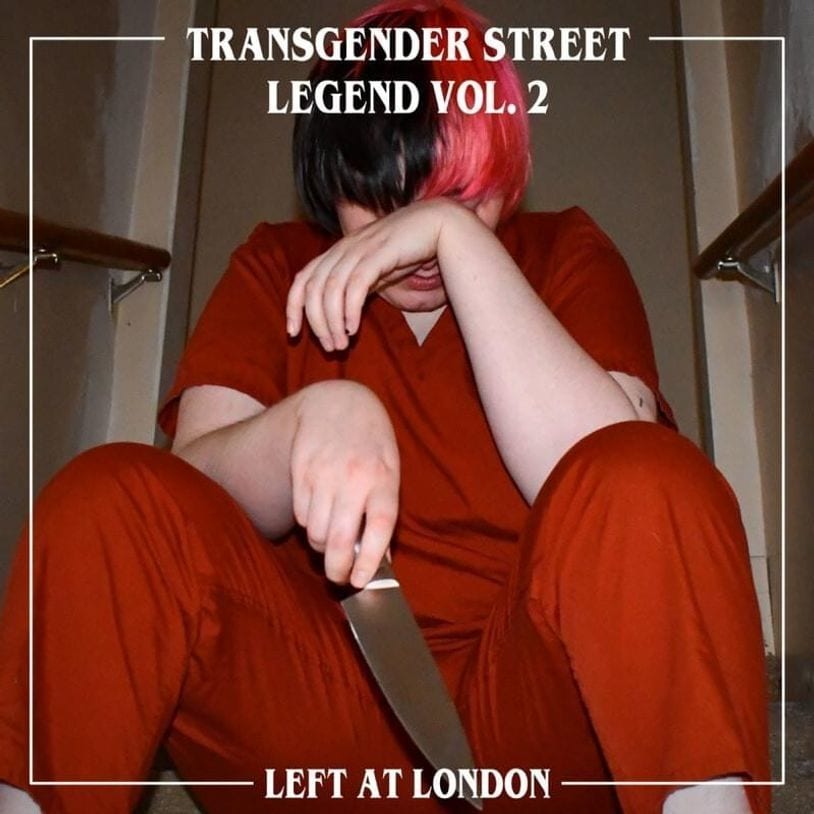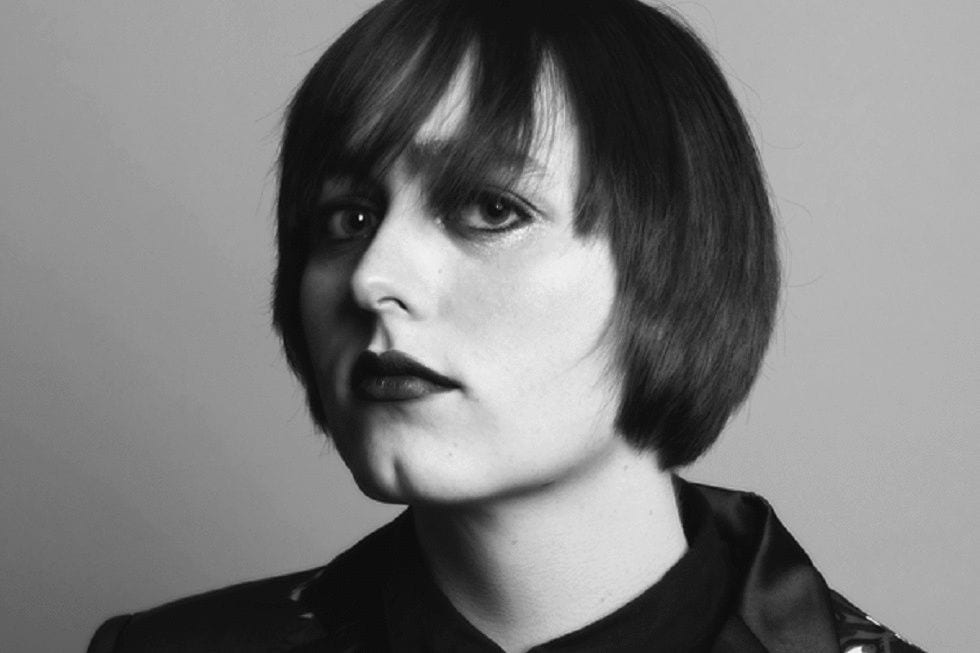
Kudos to those artists who have managed to get some work done despite the political strife and pandemic lockdowns rocking the US this year. Nat Puff — who goes by the stage name Left at London — has been one of them. Puff’s musical output this year has been prodigious: a double-sided single (Jenny Durkan Resign in Disgrace), an EP of cover songs (This One’s For the Milfs), a couple of additional songs and singles to be incorporated into future albums, and now the six-song EP Transgender Street Legend: Volume 2.
The album’s title is a nod to the much-beloved and now-defunct social media platform Vine. One of Puff’s most favorite vines featured a CD with the scrawled title Transgender Street Legend: Volume 1. “I was like — damn! That’s a dope title that will never be used unless I use it,” Puff recalls, laughing. “So that was the inspiration for the series.”
Transgender Street Legend Volume 1 was released in November 2018 to a rousing reception, so Puff decided to continue the series. The latest EP offers a superb sampling of Puff’s perfectionist production work melded to a passionate and diverse array of original pop songs. They range widely in style, from gentler chillwave and R&B-inflected tunes to the deep bass of the anti-police brutality tune “Do You See Us” with its rousing “Fuck you and the slavers that you work for / This song’s for the people you kill” chorus.

Puff’s work often weaves together the personal and political. The Jenny Durkan Resign in Disgrace EP is a call-out to the mayor of Seattle (where Puff resides), who she holds responsible for condoning police violence and causing “the citizens of a historically gay neighborhood to be gassed on the first day of Pride Month,” she explains. That track has been receiving quite a bit of local airplay, she notes with satisfaction.
The other track on that split single, “As Blue as a Bruise”, was written in the lead-up to the formation of the Capitol Hill Autonomous Zone (CHAZ) that same month. And “Do You See Us”, the powerful anthemic track on her newest EP, was recorded with the aid of local rapper Nobi. Puff wrote it the day after learning about the murder of Seattle activist Summer Taylor by a driver who deliberately rammed a Black Lives Matter rally on 4 July. The song also memorializes the murder of Cherleena Lyles, killed by Seattle police in 2017 after she called them to report a burglary. Puff and Nobi deliver a powerfully emotional tribute to the two slain Seattleites.

“It’s an angry instrumental. I really needed something that made me angry instead of mournful,” explains Puff. “Now, my mournfulness is turning into anger, and I want to use that anger in a positive way. Cherleena still hasn’t gotten justice, amongst all of these people who have not gotten justice at the hands of [Seattle Police Department]. We have a historically overfunded, bloated, and incompetent police department even by police department standards. They’ve been historically violent to innocent people, and don’t even live in Seattle usually — many of them live in richer neighborhoods a little bit east of Seattle.”
Not all of Puff’s music is political by any means — she’s also widely known for her comedic skits — but it’s difficult for any musician not to engage musically with the fraught political times in which we live.
“I’d say a musical artist’s responsibility — and I’m speaking pretty much specifically about non-Black artists and musicians — I feel like their responsibility, our responsibility, is to at least acknowledge that: number one, Black Lives Matter,” she says. “And then to acknowledge that in our music, most if not all of the influences have come directly or indirectly from Black artists. We non-Black artists have to acknowledge that we indirectly and directly profit off that. We owe it to the movement, and to the people that we’ve been inspired by, and to the Black community in general, to acknowledge that [influence] before we think of ourselves. “There’s a lot more that we can do, but that’s the bare minimum. It’s really easy to reach it, but not all artists have.”

While the new EP is titled Transgender Street Legend Volume 2, and while Puff herself has been very open about her life and identity (“I don’t really have a filter when it comes to talking about my identity,” she notes wryly), she also cautions against the tokenizing of trans musicians or others based on their identity. Indeed, she observes, there’s a broad cultural misunderstanding when it comes to how people talk about identity, in which some of the very people who criticize others for dwelling on identity politics fail to recognize its centrality in their own lives, simply because their own identities have become so normalized.
“One of my pet peeves is when people call me brave for speaking about being trans, or being lesbian, or being autistic and what have you. Not because there isn’t an inherent barrier … But the fact of the matter is that cis, het, neurotypical people don’t have that barrier, and they don’t imagine that they talk about their identity because it’s so intrinsic. It’s so ingrained into our society that that is the norm, that they don’t believe that they’re talking about their identity when they do.
“So I try to talk about my identity in the same way that I was taught I should talk about my identity when I identified as a straight, cisgender neurotypical man, which I clearly do not anymore. But I wanted to carry over that confidence and that kind of assertiveness into my identity now and try to really show people that it’s possible. I mean you’re going to get backlash, but fuck them. I don’t give a shit anymore. It’s not in my vocabulary to give a shit about people that want to hurt me.”
And as much as LGBT musicians can face discrimination in their careers, Puff warns that industry efforts to market LGBT identities as a way to make money can undermine artists and their work as well. “I make it very known that I am trans and gay in my music. I try not to sound like I’m pandering to that audience because I understand that the music I make is for me, and if people enjoy it that is a privilege and a blessing. The importance of trans people in music, in any form of cultural relevance, cannot be understated. But the fact of the matter is that it’s often understated.
“For those in the music industry, once you start looking at somebody who is trans, who is gay, who is whatever, and you see them and you think ‘That is a marketable identity’ or ‘That is a non-marketable identity’, that’s when you start fucking with the music … I think that a lot of the time my identity is seen through a capitalist lens where I am told, either directly or indirectly, that my identity is marketable or non-marketable.
“Even though my album is called Transgender Street Legend, that’s not important. That’s not the most important part of those EPs. If you listen to those EPs and think ‘Oh, she’s trans!’ I mean, it’s true, and I’m not going to be offended by the idea that I’m trans. But I am going to be offended by the idea that the rest of what I was saying did not matter to you.”
A perfectionist by nature who will spend hours working on the delivery of a single verse, Puff’s musical obsession these days is honing her newfound love of production. “Because production is like producing and composing at the same time in my case, it feels a lot more hands-on than it ever did. Being able to put my foot in the ring as a producer has really shifted the way that I work and shifted the way that I want to work.”
Although Puff didn’t release her first single until the age of 22, she’s been writing music since fifth grade. The result has been an immense storehouse of material from which she can draw. “The amount of content that I have in storage is genuinely overwhelming,” she laughs.
Although Transgender Street Legend Volume 2 is her latest release, she’s already hard at work on Volume 3 — and a whole lot more besides. Pandemic or no pandemic, her creative drive is stronger than ever. “I’m more on my grind than I ever have been!” she laughs. “I have never gotten so much done before and it’s because there’s literally no way to be distracted. [Pandemic lockdown] has been a detriment to many people’s mental health, my own included, but goddamn it if I haven’t been making some bops here and there!”

